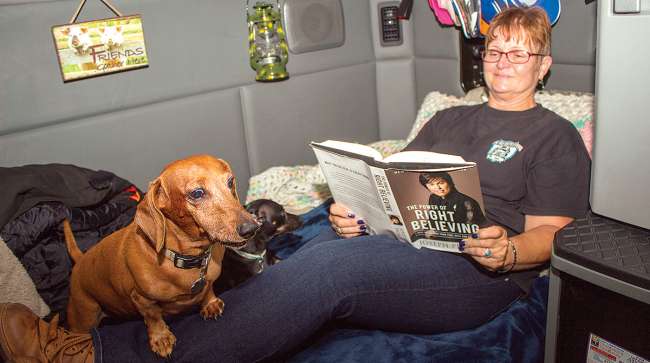Senior Reporter
Department of Labor Opinion: Driver Sleeper Berth Off-Duty Time Need Not Be Compensated

[Stay on top of transportation news: Get TTNews in your inbox.]
The U.S. Department of Labor has clarified that the time drivers spend in sleeper berths does not count as compensable time, unless they are actually performing work or are on call.
The decision was outlined in an opinion letter, written July 22 by DOL Wage and Hour Division Administrator Cheryl Stanton, based on the federal Fair Labor Standards Act.
She said that past guidance by the department’s Wage and Hour Division has been “unnecessarily burdensome for employers.”

Stanton
Stanton wrote that her opinion “adopts a straightforward reading of the plain language under which the time drivers are relieved of all duties and permitted to sleep in a sleeper berth is presumptively non-duty sleeping time and non-working time when the employer permits the employee to sleep in adequate facilities.”
The presumption that nonworking time in which the employee is relieved of all duties is not compensable holds true regardless of whether the truck is moving or stationary, Stanton said.
American Trucking Associations said the opinion will help the industry better understand its compliance obligations prospectively, rather than settling such matters only after the fact through “costly and wasteful litigation.”
“ATA commends Acting Secretary [Patrick] Pizzella and Administrator Stanton for adopting a straightforward, plain-language reading of the law, rather than the burdensome alternative interpretation embraced by those outlier decisions,” Chris Spear, the federation’s president, said July 22.
“This opinion, which is consistent with decades-old DOL regulations, the weight of judicial authority, and the long understanding of the trucking industry, clears up confusion created by two recent court decisions that called the compensability of sleeper berth time into question.”
Spear was referring to previous court decisions by federal district judges in Arkansas and Arizona that truck drivers are entitled to compensation for time in the sleeper berth. However, those decisions were preceded by two federal cases that resulted in legal rulings more favorable for carriers, including one that was affirmed by an appeals court.

Pianka
“This isn’t a regulation. This is just agency guidance,” added Richard Pianka, ATA’s deputy general counsel. “This is DOL’s view of what the law means.”
However, Pianka told Transport Topics the opinion can be expected to be very influential in court challenges on driver sleeper-berth pay issues.
“A court does not have to give this dispositive weight,” Pianka said. “But they will give it serious consideration and they will not reject it out of hand.”
Pianka continued, “We’re hoping that this opinion letter will clear up the confusion and keep outliers confined, as opposed to spreading further, and that this wave of class-action liability will simmer down.”
Andy Scott, an attorney with Atlanta law firm Fisher & Phillips LLP, who does work for trucking companies, said these cases were just starting to gather strength.
“This new opinion is going to nip that trend in the bud,” he said. “It will probably make it easier to win the cases that are currently underway.”


